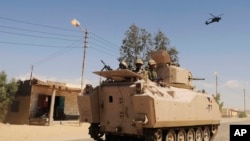Egyptian military helicopters flew over Cairo on Saturday as concern grew about terror groups that struck government security targets Thursday in the Sinai, causing numerous casualties.
President Abdel Fattah al-Sissi cut short a trip to attend an African Union summit in Addis Ababa and chaired a meeting of top military commanders Saturday. He unified the army's command structure in the Sinai to better deal with the current conflict.
Addressing a crowd of armed forces personnel, Sissi insisted Egypt would win its battle against terrorism. He said the confrontation was difficult, intense and bitter, and that the struggle would be long and costly for all Egyptians. He insisted that the Egyptian Army and police were everyone's children and that they were ready to sacrifice themselves for the nation and the region.
The Egyptian leader pointed a finger of accusation at the now-outlawed Muslim Brotherhood group — while not naming it — in connection with the Sinai attacks.
He said Egypt knew who was supporting the terror groups and would go after them. He added that the battle was being fought against a dangerous, secret group with enormous resources that is plotting, entrenched, ready and active all over the world.
The Muslim Brotherhood has repeatedly denied charges it is involved in terrorism. Other Arab countries, including Saudi Arabia and the United Arab Emirates, have also accused the group of terrorism.
At least 30 security personnel were killed in Sinai Thursday in multiple assaults. Officials said the insurgents' weapons were aimed at a military base and a hotel in the town of al-Arish where police and military officers live.
The Islamic State group's affiliate in Egypt claimed responsibility for the attacks.
Islamic extremists based in Sinai have attacked and killed hundreds of police and soldiers since Egypt's pro-Islamic president, Mohamed Morsi, was overthrown in 2013 and arrested by the military.
Sissi’s remarks also came a few days after more than 25 anti-government demonstrators were killed Sunday in Cairo and Alexandria as protesters marked the anniversary of a deadly 2011 uprising that ousted longtime autocrat Hosni Mubarak.
Paul Sullivan, who teaches at Georgetown University in Washington and who spent many years in Egypt, said he thought the Egyptian military was a major bulwark against terrorism in the Arab world and that it needed U.S. support in the Sinai.
"This is an increasingly dangerous situation," Sullivan said. "The groups in the Sinai, some of them have signed up allegiance to the so-called Islamic State. My sense is Hamas is also involved with this. ...
"This is a war not just in Egypt. It's in Libya, it's in Syria, it could easily start up in Jordan. It could easily increase in Lebanon, it could easily move more into Turkey. It's in Iraq, it could move into Saudi Arabia, it's happening in Yemen. The wall against complete chaos in the region will be the Egyptian military, and we need to support them.”
A top Hamas leader, Mahmoud Zahar, said on al-Arabiya TV that his group had “never been involved in terrorism in the Sinai."




